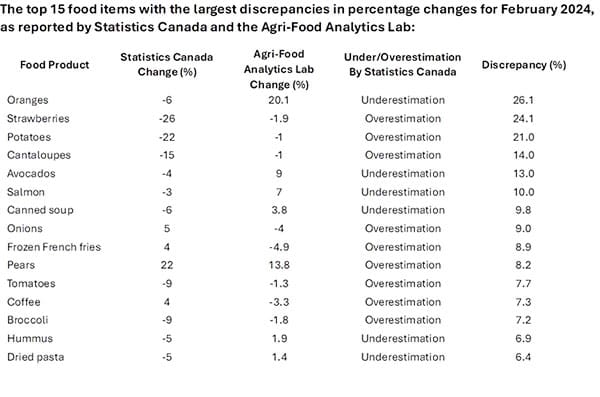Is the food inflation data from Statistics Canada reliable? An analysis says no
 Statistics Canada’s reports suggest that food inflation is easing, and prices are gradually stabilizing. However, many consumers are not experiencing this stabilization firsthand. This perceptual discrepancy has raised questions about the accuracy of Statistics Canada’s data on food prices.
Statistics Canada’s reports suggest that food inflation is easing, and prices are gradually stabilizing. However, many consumers are not experiencing this stabilization firsthand. This perceptual discrepancy has raised questions about the accuracy of Statistics Canada’s data on food prices.
Evaluating the accuracy of the federal agency’s data has proven difficult, but recent analysis provides some insights. Through systematic price checks across the country, a discrepancy between Statistics Canada’s reports and the Agri-Food Analytics Lab’s Price Portal data has emerged. While variations in methodologies and data access can vary, the discrepancy raises concerns about the reliability of national statistical forecasts and their implications for consumers and policy decisions.

For example, last week, Statistics Canada released the February 2024 list of selected food products showing significant differences compared to the prices observed in grocery stores. That list is always released a few weeks after the CPI. When comparing our list of prices with Statistics Canada’s data, we found that the Mean Absolute Error (MAE) between the two lists is 5.59. This means that, on average, prices reported by Statistics Canada deviate from the actual observed values by 5.59 percentage points.
 Photo by Kraken Images |
| Related Stories |
| Four years later, some foods are actually cheaper
|
| Grocery shoppers evolving into dedicated bargain hunters
|
| Canadians brace for food price surge in 2024
|
Specifically, data from February 2024 reveals significant variances in food price changes. For instance, oranges were reported at -6 percent by Statistics Canada, while our data shows an increase of 20.1 percent. Similarly, avocados were reported at -4 percent by Statistics Canada, compared to our observation of a nine percent increase. These discrepancies are not isolated; they are part of a pattern where 47 percent (16 out of 34 items listed) of food items are underestimated by Statistics Canada. This suggests that the agency’s reports may not always accurately reflect food inflation, although it does not indicate a deliberate underestimation.
The implications of these underestimations and overestimations are significant. For consumers, it means that the cost of living might be higher than anticipated, impacting household financial planning. For the economy, it suggests that inflation in the food sector might be more pervasive than official figures indicate, potentially leading to misinformed policy decisions.
The MAE of 5.59 is not just a statistical figure; it represents the variance in real-world costs Canadians face daily. This variance can exacerbate the financial strain on families and may necessitate a recalibration of social assistance programs to accurately reflect the cost of living.
Improving the accuracy of food price data will require Statistics Canada to refine its data collection and analysis methods. The agency should consider collaborating with independent research bodies to enhance data reliability. Such a collaboration would ensure that the data accurately reflects market trends and facilitates better-informed decision-making.
In October, Minister of Innovation, Science and Industry François-Philippe Champagne announced an investment in the Contributions Program for Non-Profit Consumer and Voluntary Organizations to broaden the scope of existing consumer projects, including expanding research in the retail sector, specifically in groceries. However, further investment is necessary.
Regardless of public opinion, Statistics Canada remains a crucial source of economic indicators. However, these are just that – indicators. Canada could benefit from a broader spectrum of reliable data sources.
While there is no reason to believe these differences are deliberate, the discrepancies highlighted by Dalhousie University’s Price Checks urge a re-evaluation of how food price data is collected and reported in Canada. Canadians need to feel confident about the accuracy of the federal agency’s reports.
Addressing these discrepancies is crucial for better budgeting and policy planning, ultimately affecting the economic well-being of all Canadians.
Dr. Sylvain Charlebois is senior director of the agri-food analytics lab and a professor in food distribution and policy at Dalhousie University.
For interview requests, click here.
The opinions expressed by our columnists and contributors are theirs alone and do not inherently or expressly reflect the views of our publication.
© Troy Media
Troy Media is an editorial content provider to media outlets and its own hosted community news outlets across Canada.

